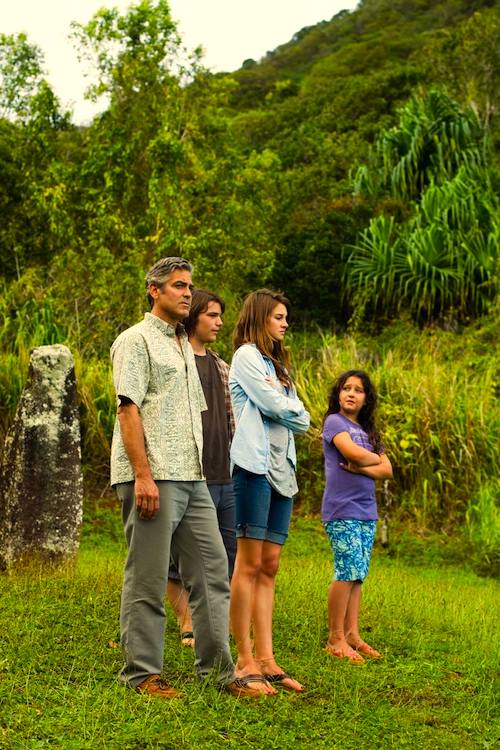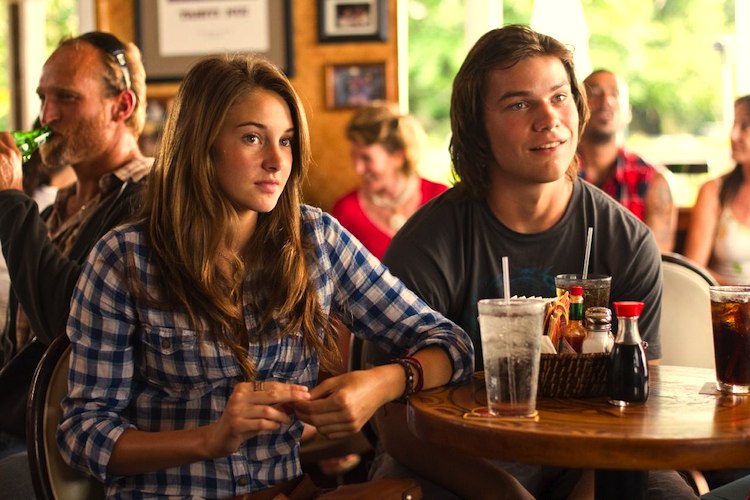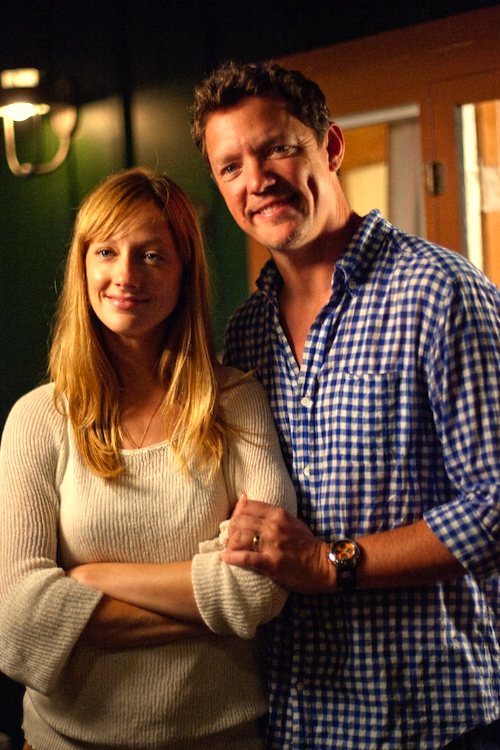
By Patricia Ducey. Early on in The Descendants, the camera sweeps lovingly over the old family portraits that line the walls of Matt King’s Oahu den. His forebearers, among them a landed Hawaiian princess and her Caucasian husband – along with their many ambitious, high achieving progeny – stare back at us radiating a self-possession and grandness we soon realize is sorely missing from Matt’s present day world.
Matt King (George Clooney) practices law and lives a middle class existence on Oahu with his family, a wife and two daughters, whom he barely relates to. He and his many cousins are heirs to the huge coastline land grant left to them by their royal and self-made ancestors – but the law mandates that they must now dissolve the trust, so they must sell the huge estate to who they decide as a family is the best buyer. The meeting will take place soon. Oh yes, I think hopefully, this will be grand: a large, wealthy family in conflict as they grapple with the meaning of legacy and of the land in this last piece of American wilderness.
But then Payne switches to Matt’s domestic crisis; his wife Elizabeth after a boating accident lies in a coma, and weak, ineffectual Matt must rise to the role of father and husband –because the one parent who made the family work is unconscious. As the family story takes over, Payne, the visual poet of Middle America and middle age, goes a bit sideways; his excursion into the tropical Eden and Matt’s discontent is not as successful as his previous films. In Election, About Schmidt, and Sideways his Midwestern protagonists feel the dissatisfactions of less than fully lived lives out there in flyover country, but they eventually claw their way out of despair through action or love.
Matt King is not so lucky, or perhaps not so brave. He retrieves his wanton teenage daughter Alexandra (Shailene Woodley) from the boarding school that is attempting, unsuccessfully, to reform her. Matt is determined that he and Alexandra, and younger girl Scottie (Amara Miller), will face the end of Elizabeth’s life together as a family. The doctor has informed him her coma is hopeless; they will remove the breathing tube per Elizabeth’s prior instructions. Both girls are bratty and foul mouthed; they humiliate and disobey their father just for the pure sport of it — because in his bumbling immaturity he allows them to, playing the ineffectual father to their faux maturity. In short, they represent the now clichéd American family, Hollywood version.

Alexandra is particularly angry with her mother, and she finally tells her father why: her mother was having an affair — something Matt, in his detachment, never even remotely suspected. Finally, Matt is furious; he confronts Elizabeth’s friends and they reveal his identity. He knows this is his chance to step up as man of action. Instead, he enlists daughter Alexandra’s help to find the man and confront him! This is something a teenager would do — and why would a man involve his daughter in the pathetic exercise of stalking her mother’s lover? Surely all hell will break loose, I surmise, and Matt will see his errors and grow up. Alas, when he and Alexandra find the hapless lover, Matt instead gives him a good talking to and then invites him to visit his dying wife in the hospital, despite the fact that the lover admits that for him the affair was not serious. At this point, I emotionally checked out. Even the plain spoken eloquence of Robert Forster as Elizabeth’s father, and the crackling life force of Woodley’s Alexandra were not enough to sustain this movie.

Clooney does a workmanlike job as Matt, a role written in defiance of – much to the movie’s detriment — a cardinal rule of screenwriting: passive protagonists are not interesting. Life happens to Matt, and he responds by avoiding it as much as possible. Alexandra becomes the parent as Matt continually defaults that role; she grabs hold of Scottie as she strays and steers her straight, she concocts the plan to find Mom’s lover, and she sees Scottie through her last goodbye to their mother. As Matt looks on.
At the appointed time, the cousins meet finally to cast their votes on how to dispose of their land. Matt wonders if they should not keep it, as a pristine and numinous remnant of their family and of history. Why not sell, a cousin counters, and let all the people enjoy it, voicing the essentially intractable argument that defines today’s environmentalism – humans versus the land. Humans are being slowly banished from Yellowstone, for instance, to favor a return to the park’s “natural” state – which then will be accessible only by whom? Elites who can afford the helicopter flyover? But Payne never develops this issue, and thus deals his movie another blow. To preserve or not preserve the estate, in a sentimental attachment to undeveloped land (out of the reach of the masses) remains the only narrative function of his filmic Hawaii, except for some de rigueur mockery of kitschy ukulele music and plastic art of the tourist’s Hawaii. A more fully realized movie about a real Hawaii, like John Sayles’s Sunshine State about Florida, dealing with family and legacy and land, has yet to be made.
The character of Matt King, the descendant of a rich Hawaiian past, remains a cipher as well. Sans epiphany or arc or growth, he curls up on the couch with the kids to watch TV at the conclusion of the film. He’s safe from everything outside again — and there’s always one of his children to make things right if real life should ever intrude.
Posted on November 28th, 2011 at 2:10pm.
Pat – Thanks for another great review. This movie has been getting so much hype (Joel Morgenstern of the WSJ said it was one of the best of the year) that I was wondering if it could possibly be that good. Clooney is being relentlessly promoted for a Best Actor Oscar for this role, but from your review it seems like he hardly deserves it. The family sounds cliched – how many movies have we seen that feature immature fathers who can’t relate to their kids – with kids who must act as the grownups? This is truly the awful legacy of the Baby Boomers: never-ending adult adolescence.
And thanks for pointing out the environmental angle. I’m one of those who believes that the earth is here for humans to enjoy – and obviously an important part of enjoying it is also taking care of it so that its natural beauty is preserved and future generations can experience it as well. It makes no sense to me to have a beautiful piece of land that nobody is allowed into. Humans are an integral part of nature and belong in the midst of it!
Morgenstern does not just promote the movie, he positively salivates over it. His big Friday spread, which usually features 3 or 4 films, was entirely devoted to The Descendants.
I have read some of the reviews, will have to read the WSJ’s.
I just don’t get what people are raving about. My suspicion is that the novel is a piece of literary fiction, and thus the movie is deemed a prestige project–and everyone wants Clooney to win an Oscar because he is the closest thing to an enduring star these days.
Descendants reminds me of American Beauty and lots of other critiques of the American family (as if there is any collective American family). Downbeat, self-hating, overpraised.
I guess I won’t be invited on any of the Oscar press junkets….
Payne is a frustrating filmmaker for me. I loved CITIZEN RUTH and ELECTION. But, SIDEWAYS and ABOUT SCHMIDT, while having great moments, each had an undercurrent of disgust for its characters.
I get the feeling Payne holds a large swath of the public in disdain, especially the “regular” people of his native Nebraska.